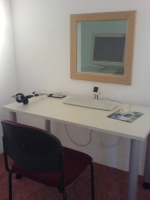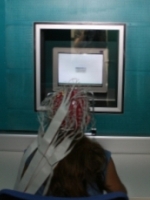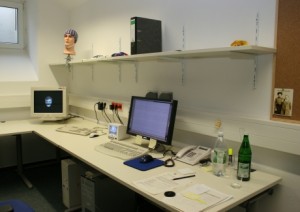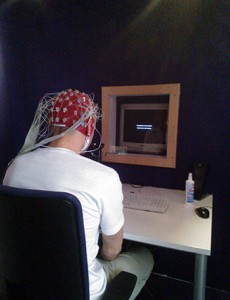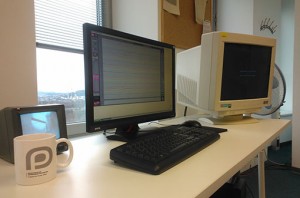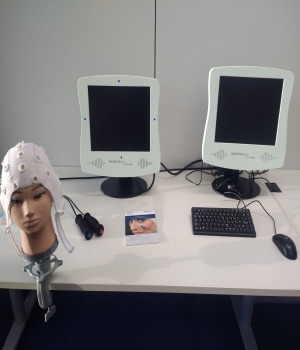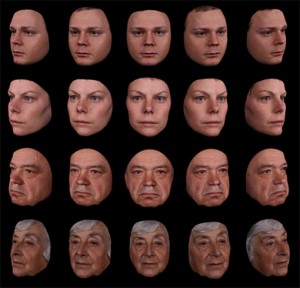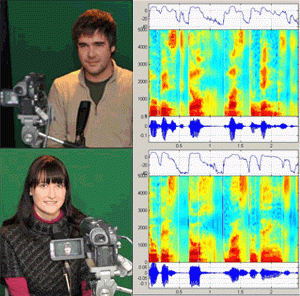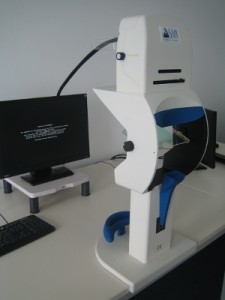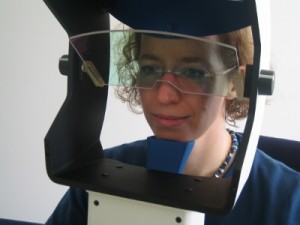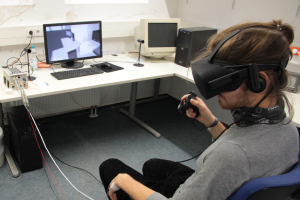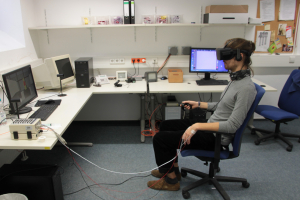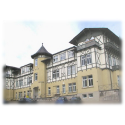Labs
Collaborative Research Facilities
Lab I – Psychophysiological Lab
This Lab supports experimental studies of cognitive function using EEG (64-channel Neuroscan Synamps DC amplifiers) and other psychophysiological parameters such as the eleoctrooculogram (EOG) or skin conductance responses (SCR).
Room: 101-102, Am Steiger 3/1
Principal investigators: Dr. Jürgen Kaufmann / Prof. Dr. Stefan R. Schweinberger
Technical assistance: Bettina Kamchen
Lab II – High-resolution EEG Lab
This Lab is designated to study neural correlates of cognitive function, as well as their brain sources, using high-resolution EEG.
Technical Equipment: 152-channel BioSemi ActiveTwo DC amplifier system
Room: K008- K010, Am Steiger 3/1
Principal investigators: Prof. Dr. Stefan R. Schweinberger / Dr. Jürgen M. Kaufmann
Technical assistance: Kathrin Rauscher
Lab III – High-resolution EEG Lab II
Our newest EEG Lab is designated to study neural correlates of cognitive function, as well as their brain sources, using high-resolution EEG.
Technical Equipment:
- electrically shelded, sound-attenuated cabin
- 64-channel BioSemi ActiveTwo recording system (DC, 512 Hz)
- active electrodes (sintered Ag-AgCl)
- no skin preparation necessary
Room: 18S03, Jentower, Leutragraben 1
Principal investigators: Prof. Dr. Gyula Kovács / Prof. Dr. Stefan R. Schweinberger
Technical assistance: Bettina Kamchen
Lab IV – Neurofeedback Lab
The Neurofeedback Lab allows to study effects of neurofeedback training (based on operant conditioning of EEG signals) which provides an alternative treatment option for various neurobiological dysfunctions. While well-known examples include ADHD and learning difficulties, neurofeedback is currently being tested as a promising approach for individuals with autism spectrum disorders.
Technical Equipment:
- 22-channel NeuroConn Theraprax Q-EEG DC-System
- 4-channel Biofeedback Option including Skin Conductance Measurement
Room: 18S07, Jentower, Leutragraben 1
Principal investigators: Prof. Dr. Stefan R. Schweinberger / Dr. Samaneh S. Dastgheib
Technical assistance: Bettina Kamchen / Kathrin Rauscher
Alumna: Dr. Stella J. Wuttke
Lab V – 3D-Camera Lab
This Lab is designated to capture three-dimensional photographs of faces.
Technical Equipment:
- DI3D™ – 3D Capture Systems
- Standard Systems: 10MP – 21MP+
- Custom Systems: Muliple Pods
- Extremely High Resolution Textures
- Instantaneous Capture
Room: 106, Am Steiger 3/1
Principal investigator: Dr. Jürgen Kaufmann
Lab VI – Audio-Visual Lab
This Lab is designated to record hiqh-quality voice recordings and capture simultaneously video material of the speaker
Technical Equipment:
- sound-attenuated room
- Zoom H4n audio interface
- Beyerdynamic MC-930 condenser microphone with pop-protector
- Sony Video Camera
- 3 point lighting system
Room: 113, Am Steiger 3/1
Principal investigator: Dr. Romi Zäske, Dr. Verena G. Skuk
Lab VII – Eye-Tracking Lab
Our eyetracking lab allows us to measure participants’ fixation patterns and pupil dilation while they look at and respond to materials such as images, spoken words and sentences, videos, or written text.
Technical Equipment:
- monocular iViewX Hi-Speed 1250 eyetracker (SMI)
- video-based dark-pupil and corneal reflection tracking
- head-stabilisation through integrated chin rest
- sampling rate 1250 Hz/ 500 Hz
- high spatial (< 0.5°) and temporal accuracy
- stimulus presentation using E-Prime 2.0 (PST) on Windows XP
Room: 18S02, JenTower, Leutragraben 1
Principal investigator: Dr. Helene Kreysa
Lab VIII – Virtual Reality Lab
Virtual reality (VR) technology is increasingly used to study human social interaction, as well as human-machine or human-robot interaction. This Lab still requires designated lab space and we are currently seeking a solution, but the basic equipment is already being used in VR experiments. In those, we can display experimental stimuli in VR, and record both behavioral and physiological responses. Designated VR labspace and state-of-the-art equipment for more extensive experiments will hopefully become available in the near future. When the institute moves to a new building (planned for late 2024), there is designated space for a large Virtual Reality lab that will be used by multiple groups. Our aim is to ensure that psychological science in Jena has access to current methods to assess behavior in complex, dynamic, and realistic social situations, with a maximum of experimental control.
Room: K008- K010, Am Steiger 3/1
Principal investigator: Prof. Dr. Stefan R. Schweinberger
Technical support: Kathrin Rauscher
Alumnus: Paul Winkler, M.Sc.

